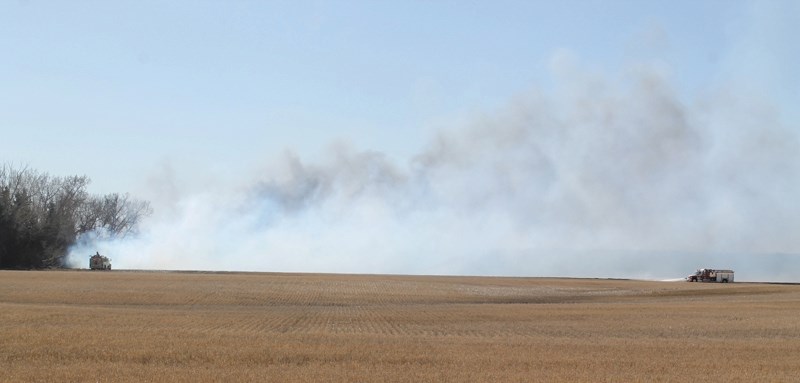In nearly two decades of firefighting, deputy chief Brian Powell of the Olds Fire Department has never seen a wildfire season like the one the area is currently experiencing.
“I've never had so many successive mutual aid gigs as what we've experienced this year where we're inviting not one, but two other departments to assist and they're doing the same,” he said. “That's unprecedented in my 18 years of doing this.”
Due to warm and dry conditions that Powell described as “extremely volatile for the potential rapid spread of fire,” the Town of Olds issued a fire ban on May 8, two days after Mountain View County imposed such a ban.
The ban includes open fires, charcoal briquette barbecues, campfires, cooking fires, burning barrels and the discharge of fireworks.
Cooking and heating appliances fuelled by natural gas are not covered under the ban.
Anyone who sets a prohibited fire will be responsible for paying the costs of having the blaze put out.
Powell said since May 1, the Olds Fire Department has responded to, or assisted other departments such as Didsbury and Carstairs on, more than two-dozen wildfires.
The Olds department alone, he added, has expended 200 man hours and upwards of 80 engine hours for vehicles and equipment in dealing with the fires.
“The guys are tired. Employers have been quite patient with us,” he said. “It's an enormously taxing time of year.”
One large fire west of Olds on the afternoon of May 6 near the intersection of Rge. Rd. 21 and Twp. Rd. 324 was sparked when an “inactive” agricultural burn pile was reignited by a large wind, Powell said.
Before it was extinguished, 20 farm structures were damaged and 18 hectares of agricultural land were burned in a short time.
“It ran a half-mile (800 metres) inside of eight to 10 minutes,” he said.
Many blazes are starting due to fires in burn barrels, Powell said, with discarded cigarettes from moving vehicles running “a close second.”
More than a dozen counties in central and south Alberta have declared fire bans and four firefighters, a pumper and a tender from Olds were dispatched to Nordegg, a community about 210 kilometres west of Olds that was under alert due to a nearby wildfire, for fire protection duties on the morning of May 13.
Along with temperatures soaring into the high teens and 20s in the first week of May, the Olds area has received little to no precipitation and, because of the late start of spring, plant growth in the region has not yet started.
“So you've got that combination of dry conditions, lots of potential fuel to burn with last year's grasses and dry components on the ground and not much recent rain with some pretty warm temperatures we have experienced in the last week and will continue to experience for the upcoming week,” said Bill McMurty, a meteorologist with Environment Canada.
He added new growth will “suppress” the dry, existing plant material on the ground to prevent the kinds of fires the region is experiencing, but the dryness and high temperatures have arrived during a “window” between the disappearance of the snow and the start of the growing season.
While the maximum temperatures for the Olds area have been higher this year compared to 2012 for the first eight days of May, McMurty said winter and spring were not drier than normal.
“From the beginning of December to the end of April, the numbers are almost bang-on normal,” he said.
A measuring station in Olds recorded 80 millimetres of water falling between the beginning of December and the end of April.
“Typically during that period, the Olds area would receive 103.9 millimetres of water equivalent,” McMurty said. “Having said that, that 80 (millimetres) might be 120 (millimetres) because the automatic station doesn't measure snow very well.”
The trend of warm and dry conditions is expected to continue this week and forecast models suggest Alberta will experience “above-normal temperatures” this summer, he said.
Norm McInnis, the Town of Olds' chief administrative officer, said the town won't go over its firefighting budget due to the fire department responding to so many calls in recent days.
But he added the dry conditions will likely lead to water restrictions in town in the coming days and weeks.
“We're anticipating that that will (come into effect),” McInnis said. “There's lots of capacity at the water treatment plant at Anthony Henday but the pipe to push water down to the midline water reservoir that's just south of Olds here and then further on down to Didsbury, Carstairs and Crossfield… getting water to the midline reservoir has been a bit of the challenge over the last few years. But they are twinning the line and that should be done this year. Hopefully, going forward, this annual water rationing from the commission won't happen.”




